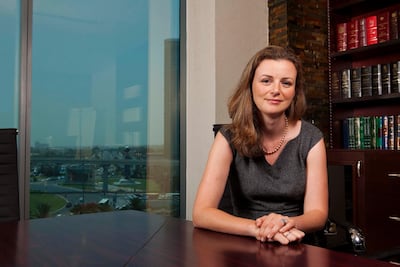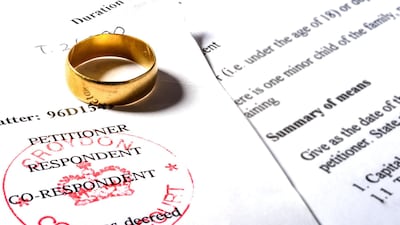Changes made to UAE family law in November have had a considerable impact on the way married people divorce in the UAE.
All expats can now ask for the laws of the country where the marriage took place to apply to their divorce, and most separating couples now choose this option, according to lawyers.
The changes most benefit the less wealthy person, said Dr Hassan Elhais, a consultant who leads the legal team at Al Rowaad Advocates in Dubai.
"We have seen a lot of demand from expats requesting to apply their home country law – many, many clients have cases in process," he said.
"Mostly it is women who would be seeking to apply the laws of the place of concluding the marriage, unless there is an exceptional scenario.
"Usually the wealthy party will try to avoid applying the foreign law because asset division is provided for under foreign law."
A slew of personal and family laws were overhauled in the UAE in November, including the statutes governing divorce and inheritance.
Family lawyers said the adjustments mean couples can now use foreign law to divide assets, and apply for spousal support and joint custody, options that are not available under local law.
Alexandra Tribe, an international divorce lawyer with Expatriate Law, said the changes had upturned the legal system for the better.
"An English couple living in the UAE, who are married in England, they can seek to apply English law to their divorce," said Ms Tribe, who practised family law in the UAE for nine years, and now lives in the UK.

"This has wide ranging implications. The UAE courts can start dividing matrimonial assets, perhaps not pensions, but savings and investments and things like that."
In the past, couples largely had to make use of Sharia-based local laws. They could apply to the court to use foreign law to divorce, but only if both parties agreed.
If the case was deemed too complicated, or there was a delay in translating documents into Arabic, or the paying party held dual nationality, then the judge had discretion not to apply foreign law.
Fairer financial settlements for women
UAE courts also did not automatically award long-term spousal maintenance to a wife, instead it was limited to three months post-divorce.
Child support is considered a different payment, and under UAE law the father is responsible for providing for the child financially, even after divorce.
That meant expat couples tended to divorce in their home country, but that was not always possible or preferable, said Ms Tribe.
"Some expats had more tenuous jurisdiction links to their home countries, and would find it difficult divorcing in their home countries," she said.
"This development is also hugely useful when you have a couple where one party is unlikely to cooperate with English proceedings, or if you've got a husband with all his assets in the UAE, and who won't pay up if he receives a UK order."

One of the hardest elements of deciding a divorce tends to be the division of assets. The wealthy party might try to hide their assets to avoid splitting them.
Now that expat couples can use foreign law to divorce in the UAE, this is less likely to happen, said Ms Tribe.
"The UAE courts are very hot on enforcement. They're also very hot on uncovering assets.
"On application, an individual can ask the UAE courts to make a search at the Land Department to determine details such as, what properties does my husband have in the UAE? What bank accounts, with which banks?
"All these things are going to be brilliant for obtaining the much needed disclosure we often need in these expat cases."
However, while many married expats look to use foreign law for their divorce, the process is not always simple, in particular in countries that use case law, rather than civil law. This could mean it takes a long time to settle.
"In England, the US, Canada, Australia and South Africa there is no statute, there is no civil law – effectively there is no rulebook," said Mr Elhais.
"That poses a practical challenge. I wouldn't say it's impossible, but it is a challenge.
"Civil law systems are much easier, like Spain, Russia and France.
"Couples may wish to factor this into their decision on where they get married."






